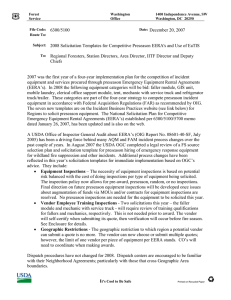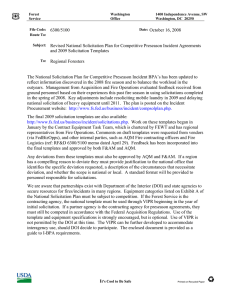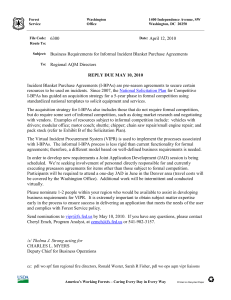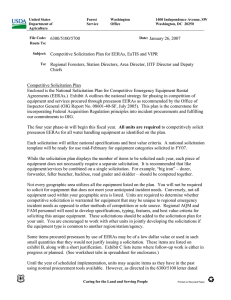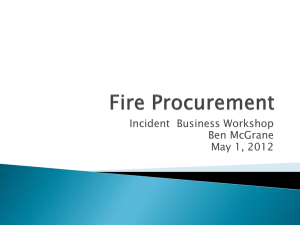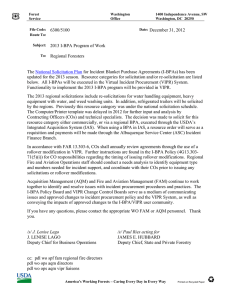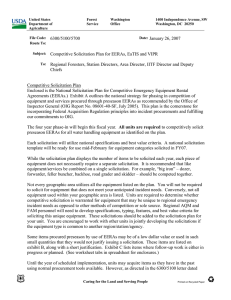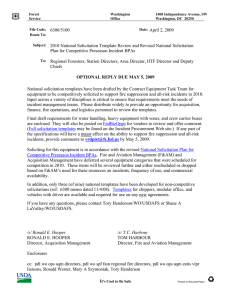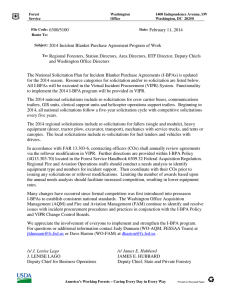Incident Acquisition Management National Logistics Workshop Reno, Nevada
advertisement
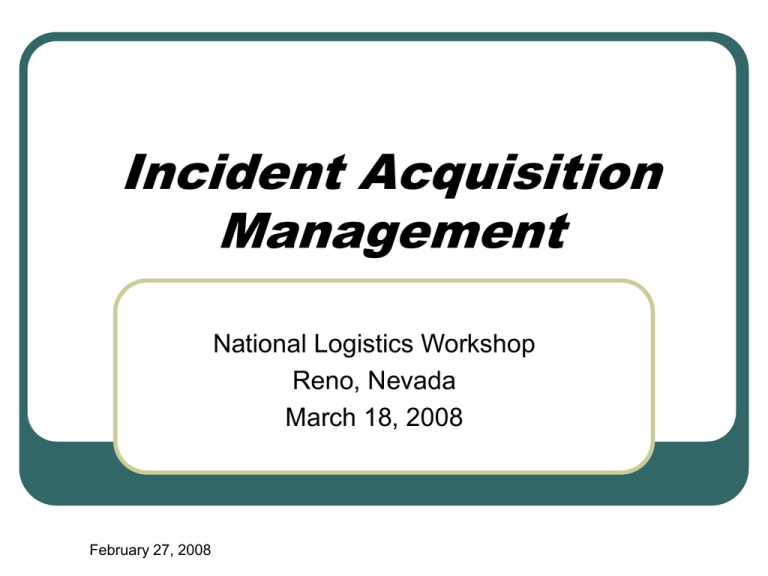
Incident Acquisition Management National Logistics Workshop Reno, Nevada March 18, 2008 February 27, 2008 Discussion Items Contract Administration Contracting Officer’s Representatives (COR’s) National Contracts National Solicitation Plan for Competitive EERA’s/I-BPA’s VIPR Contract Administration Use of contractors has increased dramatically IMT’s have responsibilities for contract administration, particularly for contracts supporting operations and logistics Essential to adequately monitor contracts to insure compliance and evaluate performance COR Certification Requirements Current requirements for COR certification in the Forest Service are still applicable. Now and continuing? COR’s must have training and resumes entered in ACMIS by June 30 (initially) Future? Increased training More Future? Program managers must have training and resumes in ACMIS WHEN? Still waiting…. Contracting Officer’s Representative Task Force (National Contracts) FAM and AQM chartered a task force led by Mike Lohrey. Task force delivered their report in March, 2007, with recommended alternatives FAM and AQM recently distributed the report along with identifying the alternative selected. Recommendations Accepted Adopt standard national structure Identify national program manager Identify number and level of certified COR’s needed and the contingent of inspectors Include Administrative Contracting Officers (ACO’s) where appropriate Next Steps to Implement Identify available training and determine what more is needed Determine which national contracts will have ACO’s Analyze national contracts and determine number and type of adequate COR’s Identify National Program Managers Develop process for insuring COR’s are certified National Contracts Mobile Food and Shower Services Type 2 IA Firefighter Crews Retardant Helicopters Large Airtankers Smokejumper Aircraft Establishing EERA Policy To meet USDA OIG Audit objectives & decrease cost: • FAR based • Best value driven • Consistent nationally EERA Process Changes FY 2007 - 2010 Competitive Solicitation Plan National Solicitation Templates Cascading Set-Aside Uniform Equipment Inspections Standardized Performance Evaluations New Name for Preseason Agreements National Solicitation Plan for Competitive EERAs/I-BPAs Competition phase-in over 4 years Solicitations cover 3 year period FY 2008 competitions: • Faller module • GIS unit • Mobile laundry • Clerical office support • Tent • Mechanic w/ service truck • Refrigeration trailer National Solicitation Templates Standard equipment specifications (CETG) Best Value award • Reasonable Price • Pass / Fail • Past Performance • Qualified Personnel • Minimum Equipment Standards Priority Dispatch • Choosing by Advantages criteria • Determines a value / $ Cascading Set-Aside Method of Award and Ranking on Dispatch Priority List New Process • Allows issuance of one solicitation with multiple • • levels of set-aside for small business preference programs. Complies with preference order as established by the FAR. • 8(a) (sole-source or set-aside) • HubZone • SDVOSB • Small Business Approved by OGC Uniform Equipment Inspections National consistency as to what equipment is inspected to what degree Balancing risk and cost, case by case Pre-award, preseason, random or no inspection CETG Standardized Performance Evaluations • Contractor Performance System (CPS) • Required by USDA • Available government-wide – facilitate Interagency use • Better suited for equipment (v. crew form) • Evaluations performed by Fire – Supervisor of equipment at incident • Put new form in your kit • Input into CPS by AQM personnel Preseason Incident BPA I-BPA: • Preseason • Non-emergency • SF-1449 EERA: • At-incident • Emergency • OF-294 VIPR - High Level Scope Is an Acquisition system All preseason incident procurement instruments • Preseason Incident BPAs • Aviation contracts • National contracts Front-end load Dispatch (ROSS) & Payment Systems Component of Incident Business Solutions (IBS) ESB Data is front-loaded for use by downstream systems without re-entry VIPR ROSS ISuite or ABS Payment Centers Reuse Data Throughout Financial Systems Cost Avoidance Forest Service Estimated Cost Avoidance $12.8 million/yr Staffing Cost Avoidance - $4.8 M/yr $ 3.4 M/year – AQM $ 1.3 M/year – Payments $ .1 M/year – Dispatch Competitive EERA/I-BPA - $8 M/yr $ 8M/yr – Lower prices through competitive solicitation* *Based on 8% of estimated $100M spent on EERA’s during average $1B fire year VIPR Phased Releases Version 1.0: Nov 2008 Preseason Incident BPA • Create solicitations • Vendor response • Award agreement • Create Priority Dispatch List Data migration from EaTIS to VIPR Deferred to Future Releases Integration with ROSS Tracking of vendor training/ qualifications (TBD) Aviation contracts National contracts Interagency capabilities Summary Points Important of Contract Administration COR Task Force and Certifications National Contracts National Templates for I-BPA’s / EERA’s VIPR Questions? Susan Prentiss, Branch Chief, Incident Support, AQM March 18, 2008 http://fsweb.wo.fs.fed.us/aqm/incident
